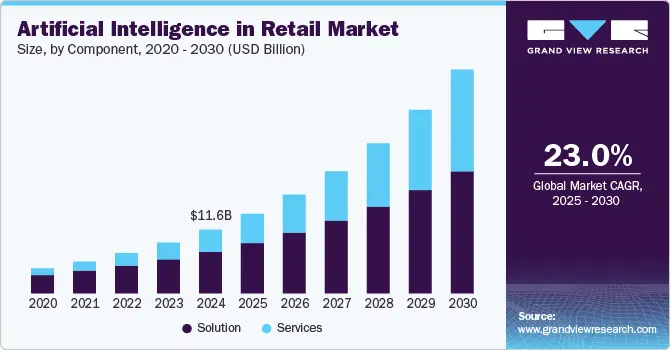Table of Contents
Introduction
The retail industry has entered a new age of digital transformation driven by rapidly evolving customer expectations and the rise of connected commerce. While technological advancements continue accelerating the industry’s evolution, businesses face mounting pressure to adapt swiftly and stay ahead of competition.
Here, artificial intelligence (AI) emerges as a pivotal force catalyzing retail’s ongoing metamorphosis. AI streamlines operations, elevates customer engagements, and empowers data-driven decision making essential for surviving in today’s competitive landscape. Through AI applications across various functions, retailers derive new streams of value that boost profits, efficiencies, and competitive differentiation.
This comprehensive report explores how AI is significantly impacting retail operations. It analyzes 20 prominent use cases, highlighting real-world examples of AI’s strategic applications. The paper also examines future retail technologies, evaluating both risks and rewards to provide retailers with strategic recommendations. Additionally, it summarizes the benefits of AI across value drivers and functions within retail organizations.
Ultimately, this report aims to serve as a guiding reference for retail executives seeking to leverage AI’s full potential through careful implementation. By examining current AI adoption trends, challenges, and growth opportunities, it equips decision-makers with practical insights for navigating this disruptive technology’s steady permeation across the industry in the coming decade.
Why is AI Crucial for the Retail Industry
AI in retail industry refers to the application of artificial intelligence technologies across various aspects of the retail business. With advanced algorithms, predictive analytics, and powerful machine learning capabilities, AI acts as a strategic partner to boost operational efficiency, enhance customer experiences, and fuel business growth.
At its core, AI involves the development of computer systems that can simulate human thought processes like reasoning, learning from experiences, sensing context, and drawing inferences. This differs from traditional programming where developments focus on providing step-by-step written instructions.
Top applications of AI in retail leverage extensive data sets along with deep learning networks, neural networks and predictive models to understand patterns, anticipate needs and automate tasks. This opens new avenues for retailers to streamline processes, innovate business models and create more personalized interactions at scale.
However, achieving this level of agility and personalization is challenging without the precision of AI. Here are some key reasons why AI Development Services is so crucial for retail success:
Precise Insights
AI processes extensive data from various touchpoints to gain accurate visibility into customer behaviors. It can analyze niche patterns that influence future trends, allowing for more proactive decision-making.
Personalization at Scale
By comprehending individual customers, AI empowers hyper-personalization across millions of interactions. It ensures that each customer receives tailored recommendations and messages rather than generic content.
Dynamic Pricing Accuracy
AI algorithms consider numerous variables to optimize pricing strategies in real-time. Retailers gain the flexibility to maintain competitiveness while maximizing revenue through precision pricing.
Optimized Inventory Management
AI forecasts demand patterns, minimizing excess stock and preventing costly shortages. This balances inventory levels with fluctuating demands optimally.
Enhanced Efficiency
AI automates repetitive processes, freeing employees for strategic initiatives. It optimizes operations continuously, streamlining workflows and boosting productivity.
Increased Engagement
AI enhances the shopping experience through virtual try-ons, seamless checkouts, and personalized recommendations. This fosters strong customer loyalty.
Informed Decision Making
AI delivers data-driven insights, enabling agile responses to market shifts. It empowers evidence-based strategic planning for long-term growth.
A Statistical Guide of AI in Retail industry
The impact of AI in the retail industry is evident through various statistics that highlight its growing importance:
- According to a report by NVIDIA, 80% of retailers believe that adopting AI technologies will significantly enhance their operational efficiency by 2025.
- A study conducted by Analytics Insight found that 80% of companies plan to adopt intelligent automation within the next few years.
- The global market for artificial intelligence in retail is projected to reach $19 billion by 2027, growing at a CAGR of 34% from 2020.

These statistics underscore the urgency for retailers to invest in AI technologies as they navigate an increasingly digital landscape.
Top 20 Use Cases in AI in Retail Industry
AI offers numerous applications within the retail sector that drive innovation and efficiency. From enhancing customer service through chatbots to optimizing inventory management using predictive analytics, these use cases demonstrate how retailers leverage technology to improve their operations. Below are 20 prominent use cases of AI in retail.
Personalized Product Recommendations
AI systems analyze customer data such as purchase history, browsing patterns, demographics and interests to determine individual preferences. Based on this rich profile, AI delivers tailored product recommendations. For example, IKEA leverages AI algorithms that consider over 50 personalization signals to suggest relevant furniture products to customers. With 80% accuracy, AI helps boost sales through hyper-relevant recommendations. Target deploys AI to deliver customized suggestions across websites, mobile apps, emails and stores.
AI Chatbots and Virtual Assistants
Virtual assistants powered by AI and NLP capabilities respond to customer queries in real-time through text, voice or interactive interfaces. Chatbots resolve issues, provide information and assist with tasks like returns processing. For instance, Gap uses Anthropic’s Constitutional AI to build respectful and helpful chatbots. Customers find chatbots useful, with 70% reporting positive interactions. AI agents handle basic queries efficiently, allowing human reps to focus on complex matters. This enhances customer satisfaction while reducing support costs.
Visual Search
Visual search capabilities allow shoppers to browse products by uploading photos of items that catch their interest. Computer vision analyzes image features to identify visually similar products. For example, Amazon Style Snap enables customers to virtually ‘try on’ outfits using their smartphone cameras. Shoes.com deploys visual search and discovery tools across over 300 brand websites. Customers can find what they like quickly, improving discovery and boosting spending. Visual search streamlines product searches, especially for undecided shoppers.
Sales Forecasting
AI makes demand forecasting highly accurate through predictive algorithms. Systems analyze diverse datasets spanningPoint of Sale (POS) records, online transactions, weather patterns, seasonality factors and more. Accurate forecasts are vital for maintaining lean inventory levels without stockouts, minimizing waste and maximizing sales. For example, Target accurately predicts demand 90 days in advance, helping stores replenish top items. The Home Depot achieved a 30% uplift in forecast accuracy with AI.
Price Optimization
Dynamic pricing powered by AI adjusts product costs in real-time response to market conditions. By optimizing pricing across multiple variables, price optimization maximizes revenues while ensuring competitiveness. Blue Yonder’s Luminate platform enhances pricing accuracy for retailers like Office Depot. Walmart optimizes prices company-wide for over 1.2 million stock-keeping units daily, boosting sales. Dynamic pricing aligns rates optimally with supply, demand as well as competitor costs.
Customer Sentiment Analysis
Sentiment analysis using NLP analyzes customer feedback to identify top pain-points. For example, Walmart reviews 130M product reviews monthly to gain customer sentiment data. AI aids in categorizing feedback as positive, negative or neutral opinions on aspects like quality, delivery or customer service. Insights from sentiment analysis enable addressing issues proactively to improve the shopping experience and reduce churn.
Predictive Analytics
Predictive analytics leverages statistical techniques and machine learning algorithms to anticipate future outcomes and behavior patterns based on historical customer data. For example, AI systems can predict the likelihood of customers purchasing certain add-on products, defaulting on payments, responding to various marketing campaigns and more. Insights from predictive analytics empower evidence-based decision making across merchandising, marketing, risk management and more.
Personalized Marketing
AI powers one-to-one marketing by considering over 50 customer attributes like profile, past purchases and online activities. AI delivers hyper-personalized content tailored to individual needs and habits. For instance, AI helps Target promote relevant products to the right customers via email and push notifications. Customized communication enhances customer familiarity and response rates, boosting overall marketing ROI.AI ensures communication is useful rather than generic spam.
Interactive In-store Experiences
AI enriches shopping through interactive displays offering tailored recommendations, how-to videos, product comparisons and AR/VR experiences right on the store floor. For example, IKEA Place app uses AR to visualize home furnishings in the physical space using phone cameras. AI tools can identify customers in-store for recommendation and promo targeting too. Interactive in-store experiences keep customers engaged while simplifying the purchase decision process.
Store Operations Management
AI optimizes in-store operations by tracking footfall, monitoring inventory levels and anticipating out of stock situations using IoT sensors. AI rearranges shelves based on sales data to highlight top-performing items and drive impulse purchases. Amazon Go stores deploy computer vision and AI for clerkless shopping. AI boosts efficiency through tasks like automated inventory management, routing for shelf replenishment, demand forecasting and maximizing space utilization.
Want to Know How AI Can Boost Sales and Efficiency in Retail?
Production Management
AI enhances production processes by detecting defects within seconds using computer vision. For instance, AI detects inconsistencies during garment sewing at a fraction of human inspection time. Predictive maintenance monitors equipment health for proactive repairs via sensor analytics. AI optimizes scheduling, resources allocation and reduces downtime to maximize production throughput. Quality assurance and efficiency gains translate to reduced costs.
Inventory and Supply Chain
AI delivers real-time supply chain visibility for efficient management across procurement, warehousing, transportation and stores. It optimizes inventory levels for lean operations by predicting demand across items, locations and time windows. AI routes shipments factoring dynamic priorities, optimizes warehouse layouts using behavioral data. Insights boost inventory turns while fulfilling orders accurately despite supply chain disruptions.
Loss Prevention and Security
Computer vision combined with AI detects anomalies in surveillance footage to flag safety hazards and suspicious activities at retail premises. AI analyzes shrinkage patterns and risks of theft to prioritize loss prevention initiatives. AI verifies identity and payment credentials for secure online transactions. It intercepts fraud when anomalies emerge during transactions by predicting fraudulent behavior patterns as purchases are made. AI enhances safety, security and compliance.
E-commerce Operations
AI streamlines e-commerce through intelligent order management systems that optimize order packing workflows. AI powers chat commerce enabling fast and personalized shopping assistance side by side live messaging. AI-based product recommendation engines analyze purchase patterns and current shopping carts to suggest complimentary items. AI chatbots resolve customer issues 24/7.This drives conversions while enhancing experience.
Procurement Department
AI optimizes procurement processes by predicting demand trends and item requirements for lean inventory. Supplier performance analytics identifies best partners meeting quality and service commitments. AI negotiates contracts dynamically considering supply/demand dynamics to lock competitive pricing. AI-based decision support delivers automated purchase order creation and approval to enhance efficiency of procurement processes.
Sustainability Initiatives
AI tools can monitor distribution networks, supplier interactions, manufacturing processes and product returns/disposal patterns to measure a business’ environmental footprint. AI leverages sustainability best practices across industries for reducing wastage. It pinpoints impact hotspots like energy use or water consumption for well-informed optimizations helping businesses achieve ESG targets and improve operations sustainably.
Fraud Prevention and Detection
AI analyzes behavioral data, payment details and device attributes to proactively detect payment and identity fraud. AI monitors for anomalies across financial transactions and flags potentially risky activities in real time. For instance, Mastercard’s artificial intelligence detects more than 150 million attempts at fraud worldwide each day based on prior cases. AI strengthens compliance while reducing losses to criminals.
Demand Forecasting
Leveraging ML techniques, AI accurately predicts demand by analyzing historic trends, similar past periods, events, pricing and more. It factors trend deviations for scenario-based forecasts. For example, Anthropic’s AI increased demand forecasting accuracy by 15% for Adidas by considering varied patterns across regions/products/seasons and COVID-19 impacts on shopper sentiments/preferences. AI reduces uncertainties for better preparedness.
Product and Display Design
Iterative design processes are optimized by AI that generates, simulates and tests new product configurations and retail space setups across AR/VR simulations. It identifies hit formulas early by predicting customer responses based on psychological and behavioral analytics. AI fuels innovation by evaluating untapped opportunities and iterating proposed solutions based on usability/feasibility/manufacturability. Early identification of breakthroughs boosts ROI.
Automated Content Generation
AI powers personalization at scale by generating customized product descriptions, visual assets, emails and other digital content on the fly. For example, Anthropic’s Constitutional AI writes product listings for Walmart that improve conversions. Prowriting aids generate visual assets, blog posts, and e-book chapters autonomously at scale. AI-based automation reduces workload while enhancing experiences and personalized engagement boosting sales.
The Benefits in AI Integration in Retail Industry
With growing use cases ranging from predictive analytics to virtual assistants, AI is revolutionizing the retail industry. Key to this disruption are the numerous benefits that AI brings such as operational efficiency improvements, enhanced customer experiences, and data-driven strategic planning. Here are some of the top ways AI delivers value for retail businesses:
Personalization
AI elevates customer interactions by understanding individual shopping behaviors, preferences, and interests comprehensively. Personalized recommendations, content, offers and experiences drive higher satisfaction ratings and foster long-term loyalty. The ability to anticipate customer needs allows retailers to proactively cater to demands, boosting sales and return on ad spend.
Enhanced Customer Service
AI-powered virtual agents and chatbots assist customers anytime through websites, apps and social media. They resolve basic queries rapidly to reduce wait times and improve satisfaction. AI support agents resolve issues more consistently by drawing on extensive training. This enhances responsiveness at scale, freeing staff for high-priority tasks.
Increased Efficiency
AI automates labor-intensive processes such as demand forecasting, inventory checks and merchandising to optimize operations. It reduces human errors and delivers fast, data-driven decisions. AI streamlines workflows across silos by providing a unified view. This empowers retailers with agility, insights and productivity for sustainable competitive advantage.
Better Pricing and Promotions
Dynamic pricing powered by AI optimizes product costs in sync with market factors. AI drives promotions ROI through targeted, personalized campaigns. AI helps anticipate spikes and fluctuations rather than reacting belatedly. This powers sales velocity while maintaining competitive positioning.
Fraud Detection and Prevention
AI safeguards operational integrity using predictive analytics and anomaly detection capabilities. It analyzes purchase patterns, customer attributes and transaction metadata to identify indicators of fraudulent activities undetectable to humans alone. By anticipating risks and shielding the enterprise from undue losses, AI bolsters profitability while strengthening brand trust.
Increased Customer Engagement
With AI-enhanced personalization, shoppers receive tailored suggestions aligning with individual likings. Seamless experiences increase average order values and customer satisfaction levels.AI positively influences shopper sentiments, boosting customer lifetime value, cross-selling potential and advocacy. This translates to exponential revenue growth over the long run.
Enhanced Customer Experiences
AI empowers retailers with deep customer comprehension capabilities. Convenient, personalized experiences build brand loyalty while boosting impulse purchasing. Interactive tools like virtual stylists, automated returns and visual search simplify purchase decisions. Enhanced satisfaction ratings amplify sales by strengthening the emotional connection with customers.
Effective Promotion and Merchandising
AI tailors marketing strategies and campaigns, determining whom to target, when to engage and with what message based on contextual cues. Integrating AI-powered tools for influencer engagement, personalized pricing and predictive content creation maximizes campaign KPIs. AI drives sales velocity by focusing resources on valuable customer segments.
Enhanced Operational Efficiency
AI takes over repetitive, tedious activities like inventory management, logistics optimization and facility maintenance. AI frees valuable resources otherwise spent on mundane tasks,channeling workforce expertise into more strategic initiatives. This boosts productivity of retail employees in delivering an impressive customer experience.
Informed Business Decisions
AI grants real-time visibility across operations by compiling data silos into a centralized knowledge base. Precise analytics uncover patterns and trends invisible to humans. AI powers agile decision making and rapid pivot capabilities essential in dynamic industries. This empowers business leaders and improves enterprise resilience.
Challenges in Adopting AI in Retail Industry
While AI promises many benefits, retailers also face challenges that can act as roadblocks in harnessing this transformational technology. Identifying and addressing these hurdles is vital for organizations looking to reap AI’s full potential. Here are some of the key challenges in AI adoption within the retail realm:
Data Privacy Concerns
With the volume of customer data being collected increasing exponentially, data privacy risks emerge as a top concern. Regulations like GDPR mandate stringent controls over PII usage. Retailers risk damage to reputation and hefty penalties for non-compliance. This necessitates robust strategies to anonymize and secure consumer data through its AI use lifecycle.
Lack of Skilled Workforce
Developing customized AI applications demands professionals highly skilled in domains like Data Science, Machine Learning and NLP. However, global talent shortages prevail across these specialized roles. In-house capabilities demand diligent training or tapping external expertise, inflating costs. Staffing AI teams sustainably remains a challenge.
High Implementation Costs
Deploying AI necessitates substantial investments spanning hardware infrastructure, specialized Retail & Ecommerce Software licenses, consulting fees and change management expenses. These costs significantly impact cash flows, especially for smaller retailers. Moreover, quantifying ROI from initial pilots can be difficult, creating hesitation around large-scale adoption.
Integration with Legacy Systems
Most retailers rely on complex legacy infrastructure spanning Point of Sale systems, ERPs and logistics platforms. Integrating advanced AI tools seamlessly with these dated systems becomes problematic, necessitating customized integration workarounds. Compatibility issues delay ROI realization and disrupt established workflows.
Algorithm Bias
AI relies on historical data for training models, risking bias when datasets exclude certain demographics unintentionally. Models can learn and perpetuate human prejudices, requiring constant monitoring and improvements. Mitigating algorithmic unfairness across sensitive use cases like credit assessment remains challenging.
Choose A3Logics as your Partner for AI-driven Retail Transformation
Leveraging advanced large language models through their state-of-the-art end-to-end AI solutions platform ‘Zebrain’, A3logics is redefining operations and experiences across global enterprises. Powered by cutting-edge NLP techniques and Deep Learning algorithms, Zebrain enables fluid configuration of powerful AI applications for any workflow through its no-code Flow interface.
A3Logics, being one of the best AI Development Companies, helps retailers address complex challenges by developing impactful use cases spanning demand forecasting, predictive pricing, fraud detection and more. Their platform seamlessly aggregates data from diverse sources, empowering businesses with actionable real-time insights.
A3Logics, the top Enterprise AI Development Company, elevates retail operations with strategic consulting, flawless implementation and ongoing support delivered by a team of over 500+ skilled AI professionals. Their proven offerings deliver faster ROI through accelerated deployments and low maintenance requirements. Trusted by Fortune 500 brands across industries, A3Logics is uniquely positioned to drive transformational AI adoption for sustainable competitive differentiation in dynamic markets.
Transform Your Retail Strategy with AI – Book a 30-Minute Free Consultation Today!
Conclusion
With advances in AI and Machine Learning growing exponentially, retailers are optimally placed to reap benefits through innovative applications spanning every aspect of operations. Personalization, predictive capabilities, intuitive interfaces and hyper-scale automation make AI a priority for businesses seeking to sustain profitability in the dynamic retail landscape of tomorrow. While risks persist around cybersecurity, algorithmic bias and talent shortages, proactive measures can help harness immense opportunities. Strategic partnerships with experienced AI solution providers will empower organizations to stay ahead of competition through data-driven initiatives that elevate customer experiences, boost employee productivity and foster enduring growth. The top 20 use cases analyzed demonstrate a pathway to success while emphasizing the vital role AI will continue to play in revolutionizing commerce experiences globally. As technology evolves rapidly, leveraging AI to solve complex retail challenges remains key for achieving new frontiers of efficiency, revenue and overall business success.
FAQs
What is AI for Retail?
AI in Retail industry refers to the application of artificial intelligence technologies in various aspects of the retail sector. It encompasses the use of advanced algorithms, machine learning and natural language processing capabilities to enhance retail operations, customer experiences and business decision making. From predictive analytics and automated processes to personalization engines and AI-powered chatbots, AI is transforming how retailers engage customers, manage inventory and streamline workflows for sustained growth.
How does AI improve customer experiences in retail?
AI enhances customer experiences in retail through hyper-personalization, seamless assistance and intuitive interfaces. It analyzes behavioral data to deliver tailored recommendations, offers and content customized to individual needs and preferences. AI chatbots and virtual assistants provide instant, 24/7 support across physical stores and digital touchpoints. Immersive features like interactive displays, augmented reality apps and visual search simplify shopping processes to improve satisfaction levels.
What are the benefits of AI for retail?
AI delivers many advantages to the retail sector by optimizing operations, customer interactions and strategic planning. Key benefits include improved personalization, enhanced customer service, increased efficiencies, better pricing and promotional strategies, strengthened loss prevention, elevated customer engagement levels and data-driven decision making supported by real-time predictive insights. AI streamlines workflows, maximizes productivity and empowers competitive differentiation in dynamic markets.
How can AI help retailers with inventory management?
AI enhances inventory management in various ways. It powers demand forecasting by analyzing historical sales along with other factors to predict needs accurately. AI delivers precise visibility into stock levels through predictive alerts. It optimizes product placement, replenishment schedules and distribution to balance supply with demand. AI supports just-in-time replenishment strategies, minimizing wastage from excess stock or costly stockouts. Overall, Enterprise AI Chatbot Development Services helps retailers maintain ideal inventory turns while fulfilling orders profitably.
What is the future of AI in retail?
AI in retail is poised for exciting advancements including automated product tagging, cashier-less shopping experiences, inventory-free fulfillment, AI-powered try-on mirrors and assistive robotics. Advanced AR and VR innovations will deliver immersive shopping. Computer vision and predictive maintenance will optimize operations. Conversational AI will drive seamless self-service. Algorithms will get more robust through unsupervised learning from diverse data sources. AI safety measures will strengthen risk governance. Overall, AI will reinvent retail experiences, further streamlining operations through precision, scale and agility.







